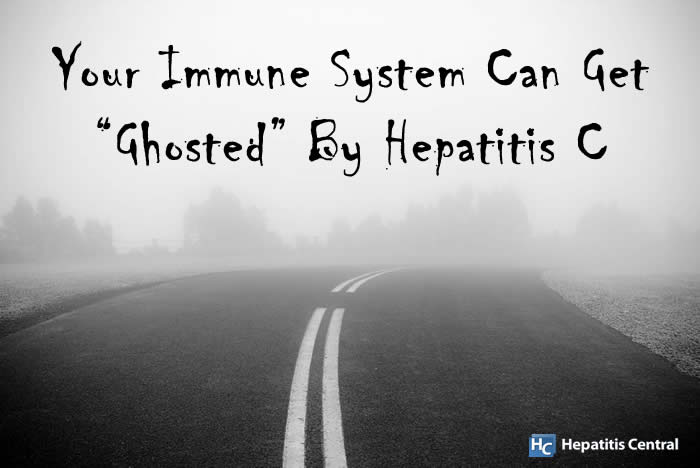Your Immune System Can Get “Ghosted” By Hepatitis C


Ghosting is a word that is oftentimes used to describe when someone or something leaves or is unavailable without an explanation. In this scenario, hepatitis C is the one doing the ghosting to our immune system. The virus is still present, but our immune system thinks otherwise.
What Happens
Hepatitis C is a viral infection that causes liver inflammation and leads to liver damage. Since the virus is able to reproduce very well in the liver, it ends up being one of the leading causes of liver disease in the world. Infection of the hepatitis C virus (HCV) comes from contaminated blood that enters the bloodstream of someone who is not infected. (1)
Since HCV attacks your liver, this virus is deadly. The bad news is that the initial infection rarely comes with symptoms and can go undiagnosed for 6 to 12 months. The U.S. Preventative Services Task Force recommends that anyone age 18 to 79 get screened for hepatitis C, even if they aren’t showing symptoms. Individuals born between 1945 and 1965 are five times more likely to be infected than people born in other years. (1)
Untreated HCV will start to spread through your liver and release inflammatory responses. As time goes on, these responses result in scarring of the liver. The liver is a necessary organ to clear out any toxins that are hanging out in our body. As the scarring of the liver builds up, it begins to function less than normal. Toxins will start to build up and a noticeable side effect is jaundice, which is the yellowing of the skin, whites of the eyes, and mucous membranes. (2)
HCV infections have treatments available, so it’s important to detect the virus early in order to avoid continued damage to the liver resulting in liver disease.
Why it Happens
Why is it that HCV can stay undetected for so long? Scientists at Trinity College Dublin set out to answer just that.
In normal situations, our cells are able to communicate with each other via molecules called cytokines. These cytokines activate signaling pathways which trigger hundreds of molecules in our cells to increase inflammation and anti-viral activity. This is an immune response that is able to kill and clear viral infections from our bodies. (3)
If inflammation is uncontrolled, it starts to get dangerous. Immune regulators referred to as “Suppressor of Cytokine Signaling” (SOCS) ensure that the immune response to infections is regulated. Over time after an initial inflammatory response, SOCS shuts down the cytokine signaling pathway.
Here’s where it gets tricky. HCV “ghosts” our immune system by giving off its own SOCS regulators. Trinity scientists found that a certain part of the virus is responsible for increasing a SOCS molecule in both the liver and immune cells.
Dr. Nigel Stevenson, an Assistant Professor in Immunology at Trinity, states that “HCV hijacks this regulatory process by causing the expression of SOCS in our cells. By increasing the expression of SOCS, HCV basically dulls the normal immune response to viral infection. Without a strong signal our body’s cells cannot then mount an effective inflammatory and anti-viral response that clears infection.” (3)
He continues to say that “This ability shields HCV from our body’s normal, effective anti-viral immune response and creates a perfect environment in which to survive, replicate and infect other cells. Many diseases are mediated by increasing the inflammatory response to an inappropriately high level, but in this case it is the lack of adequate inflammation that enables HCV to go undiagnosed, leaving it free to rapidly replicate and infect other cells.” (3)
Risk of Hepatitis C Infection
Some factors can actually increase your risk of getting hepatitis C. Mayo Clinic (1) mentions the following:
- Have HIV
- Are a health care worker who has been exposed to infected blood
- Ever injected or inhaled illicit drugs
- Got a piercing or tattoo in an unclean environment and with unsterile equipment
- Received a blood transfusion or organ transplant prior to 1992
- Received clotting factor concentrates before 1987
- Received hemodialysis treatments for long periods of time
- Were born to a woman with a hepatitis C infection
- Were ever in prison
- Born between 1945 and 1965
Takeaway
Hepatitis C can either be acute (short-term illness) or chronic (lifelong), with over half of individuals infected developing a chronic infection. This virus is treatable, so it’s important to see a doctor for testing if you feel that you’ve been exposed to it. As we have learned thanks to the scientists at Trinity College, just because you’re infected doesn’t mean that symptoms will show up.
1. Hepatitis C. 20 Mar. 2020, www.mayoclinic.org/diseases-conditions/hepatitis-c/symptoms-causes/syc-20354278.
2. “Adult Jaundice: Symptoms, Causes, Diagnosis, Treatment & Prevention.” Cleveland Clinic, my.clevelandclinic.org/health/diseases/15367-adult-jaundice.
3. “How Hepatitis C 'Ghosts' Our Immune System.” ScienceDaily, ScienceDaily, 5 June 2019, www.sciencedaily.com/releases/2019/06/190605105940.htm.






